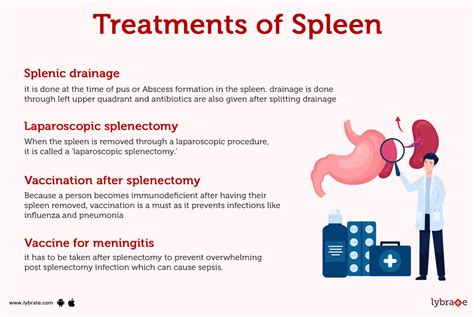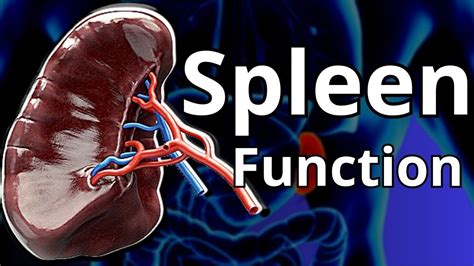Intro
The spleen is an often-overlooked organ in the human body, yet it plays a vital role in our overall health and well-being. Located in the upper left region of the abdomen, the spleen is a small, bean-shaped organ that is responsible for filtering the blood and storing red blood cells. Despite its importance, many people are unaware of the spleen's functions and the impact it has on our daily lives.
The spleen is a part of the lymphatic system, which is a network of organs and tissues that help to defend the body against infection and disease. The spleen's primary function is to filter the blood, removing old, damaged, or abnormal red blood cells from circulation. This process helps to prevent the spread of infection and disease, and also helps to maintain healthy blood cells. In addition to filtering the blood, the spleen also stores red blood cells and platelets, which are released into the bloodstream as needed.
The spleen is also involved in the immune system, helping to fight off infections and diseases. It produces antibodies, which are proteins that help to recognize and attack foreign substances, such as bacteria and viruses. The spleen also helps to remove these foreign substances from the bloodstream, helping to prevent infection and disease. Overall, the spleen plays a crucial role in maintaining our overall health and well-being, and any problems with the spleen can have significant consequences.
Functions of the Spleen

The spleen has several important functions that help to maintain our overall health. Some of the key functions of the spleen include:
- Filtering the blood: The spleen helps to remove old, damaged, or abnormal red blood cells from circulation, which helps to prevent the spread of infection and disease.
- Storing red blood cells: The spleen stores red blood cells and platelets, which are released into the bloodstream as needed.
- Producing antibodies: The spleen produces antibodies, which are proteins that help to recognize and attack foreign substances, such as bacteria and viruses.
- Removing foreign substances: The spleen helps to remove foreign substances, such as bacteria and viruses, from the bloodstream, which helps to prevent infection and disease.
Importance of the Spleen
The spleen is an important organ that plays a vital role in our overall health and well-being. Without a spleen, the body would be more susceptible to infection and disease, and the risk of serious health problems would increase. Some of the importance of the spleen includes:- Preventing infection: The spleen helps to prevent the spread of infection and disease by removing old, damaged, or abnormal red blood cells from circulation.
- Maintaining healthy blood cells: The spleen helps to maintain healthy blood cells by storing red blood cells and platelets, and releasing them into the bloodstream as needed.
- Fighting off diseases: The spleen helps to fight off diseases, such as infections and cancers, by producing antibodies and removing foreign substances from the bloodstream.
Spleen Problems and Diseases

The spleen can be affected by a variety of problems and diseases, which can have significant consequences for our overall health and well-being. Some of the common spleen problems and diseases include:
- Splenomegaly: This is a condition where the spleen becomes enlarged, which can be caused by a variety of factors, such as infection, cancer, or blood diseases.
- Spleen rupture: This is a condition where the spleen ruptures, which can be caused by trauma or injury to the abdomen.
- Spleen cancer: This is a type of cancer that affects the spleen, which can be caused by a variety of factors, such as genetics, infection, or environmental factors.
- Spleen infection: This is a condition where the spleen becomes infected, which can be caused by a variety of factors, such as bacteria, viruses, or fungi.
Symptoms of Spleen Problems
The symptoms of spleen problems and diseases can vary depending on the underlying cause, but some common symptoms include:- Abdominal pain: This is a common symptom of spleen problems, which can range from mild to severe.
- Fatigue: This is a common symptom of spleen problems, which can be caused by a variety of factors, such as anemia or infection.
- Weight loss: This is a common symptom of spleen problems, which can be caused by a variety of factors, such as cancer or infection.
- Fever: This is a common symptom of spleen problems, which can be caused by a variety of factors, such as infection or inflammation.
Treatment Options for Spleen Problems

The treatment options for spleen problems and diseases depend on the underlying cause, but some common treatment options include:
- Surgery: This is a common treatment option for spleen problems, which can involve removing the spleen or repairing damage to the spleen.
- Medication: This is a common treatment option for spleen problems, which can involve taking antibiotics or other medications to treat underlying infections or diseases.
- Radiation therapy: This is a common treatment option for spleen cancer, which can involve using radiation to kill cancer cells.
- Chemotherapy: This is a common treatment option for spleen cancer, which can involve using chemotherapy to kill cancer cells.
Prevention of Spleen Problems
Preventing spleen problems and diseases is an important part of maintaining our overall health and well-being. Some ways to prevent spleen problems include:- Practicing good hygiene: This can help to prevent the spread of infection and disease, which can affect the spleen.
- Getting vaccinated: This can help to prevent the spread of infection and disease, which can affect the spleen.
- Eating a healthy diet: This can help to maintain healthy blood cells and prevent spleen problems.
- Avoiding trauma: This can help to prevent spleen rupture and other spleen problems.
Living with Spleen Problems

Living with spleen problems and diseases can be challenging, but there are many ways to manage symptoms and maintain overall health and well-being. Some ways to live with spleen problems include:
- Following a treatment plan: This can help to manage symptoms and prevent complications.
- Practicing self-care: This can help to maintain overall health and well-being, and reduce stress and anxiety.
- Seeking support: This can help to cope with the emotional and psychological impact of spleen problems.
- Staying informed: This can help to understand spleen problems and diseases, and make informed decisions about treatment and care.
Coping with Spleen Problems
Coping with spleen problems and diseases can be challenging, but there are many ways to manage symptoms and maintain overall health and well-being. Some ways to cope with spleen problems include:- Seeking support from family and friends: This can help to cope with the emotional and psychological impact of spleen problems.
- Joining a support group: This can help to connect with others who are experiencing similar challenges and share experiences and advice.
- Practicing stress-reducing techniques: This can help to reduce stress and anxiety, and maintain overall health and well-being.
- Staying positive: This can help to maintain a positive outlook and cope with the challenges of living with spleen problems.
What is the function of the spleen?
+The spleen is an organ that filters the blood, stores red blood cells, and produces antibodies to help fight off infections and diseases.
What are the symptoms of spleen problems?
+The symptoms of spleen problems can vary depending on the underlying cause, but common symptoms include abdominal pain, fatigue, weight loss, and fever.
How can I prevent spleen problems?
+Preventing spleen problems involves practicing good hygiene, getting vaccinated, eating a healthy diet, and avoiding trauma to the abdomen.
We hope this article has provided you with a comprehensive understanding of the spleen and its importance in our overall health and well-being. If you have any further questions or concerns, please don't hesitate to reach out. We encourage you to share this article with others who may be interested in learning more about the spleen, and to take steps to maintain a healthy spleen and overall well-being. By working together, we can promote greater awareness and understanding of this vital organ and its role in our health.
